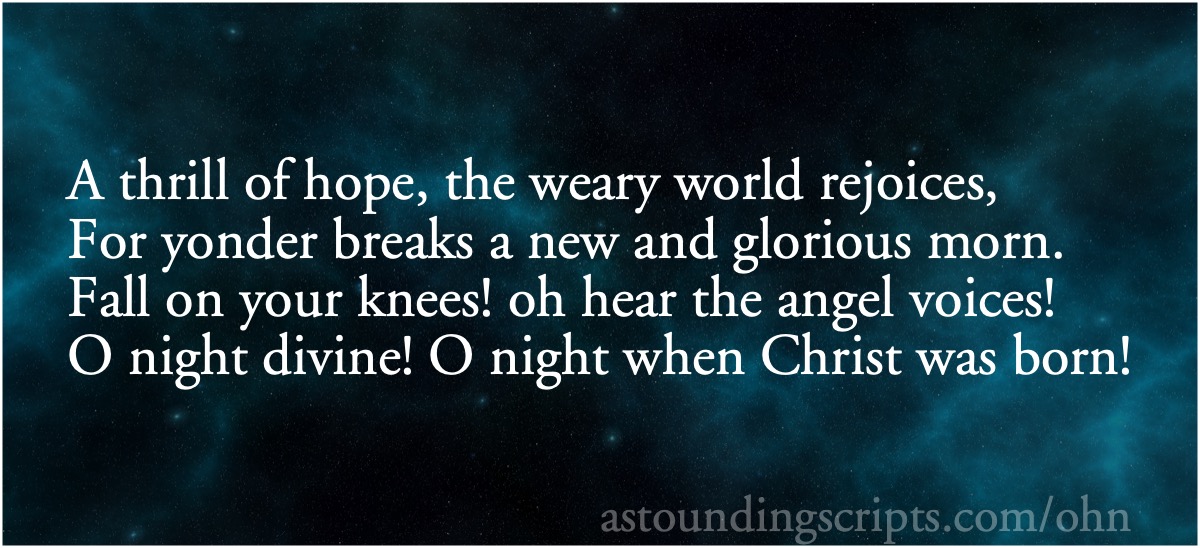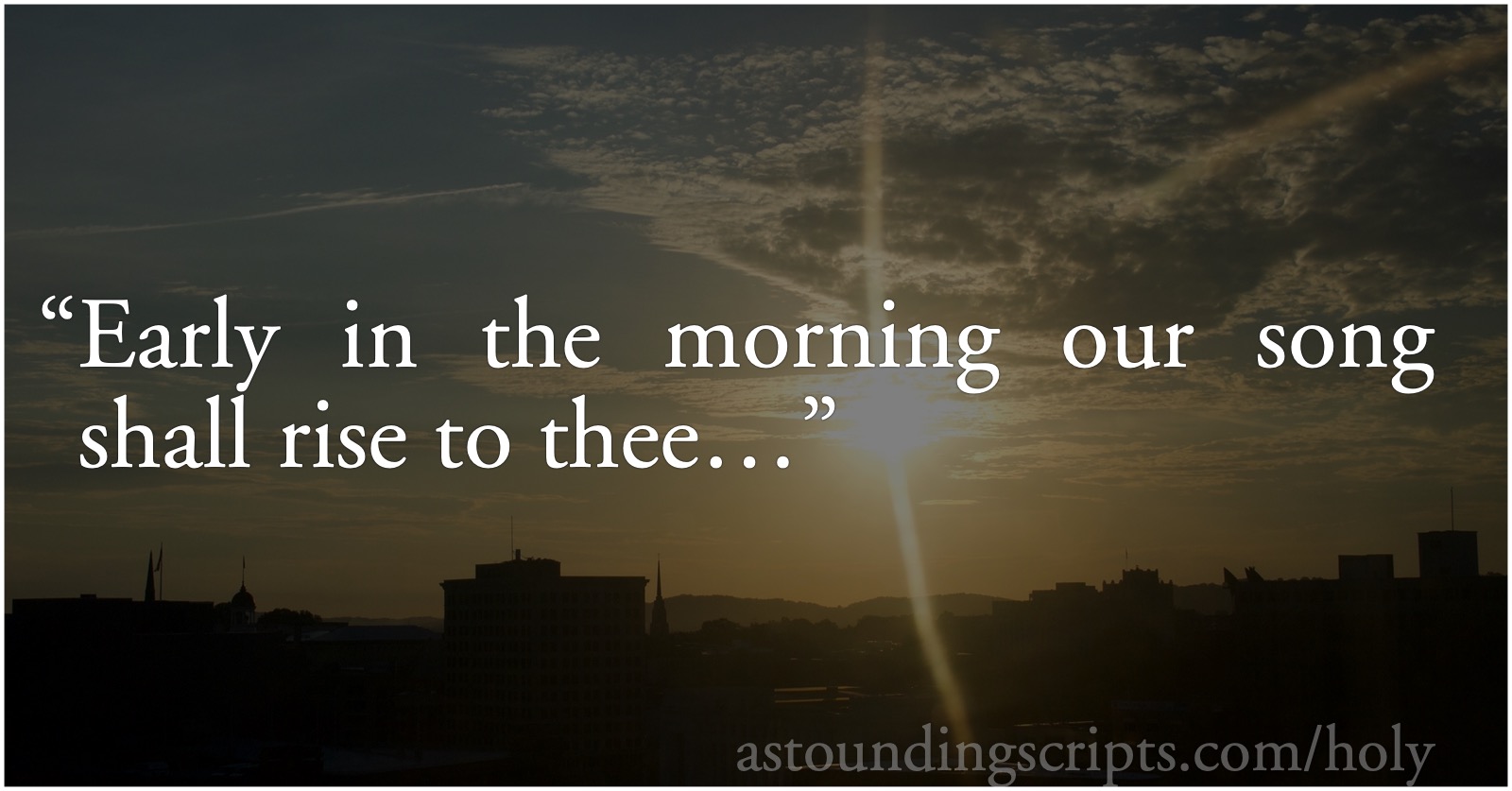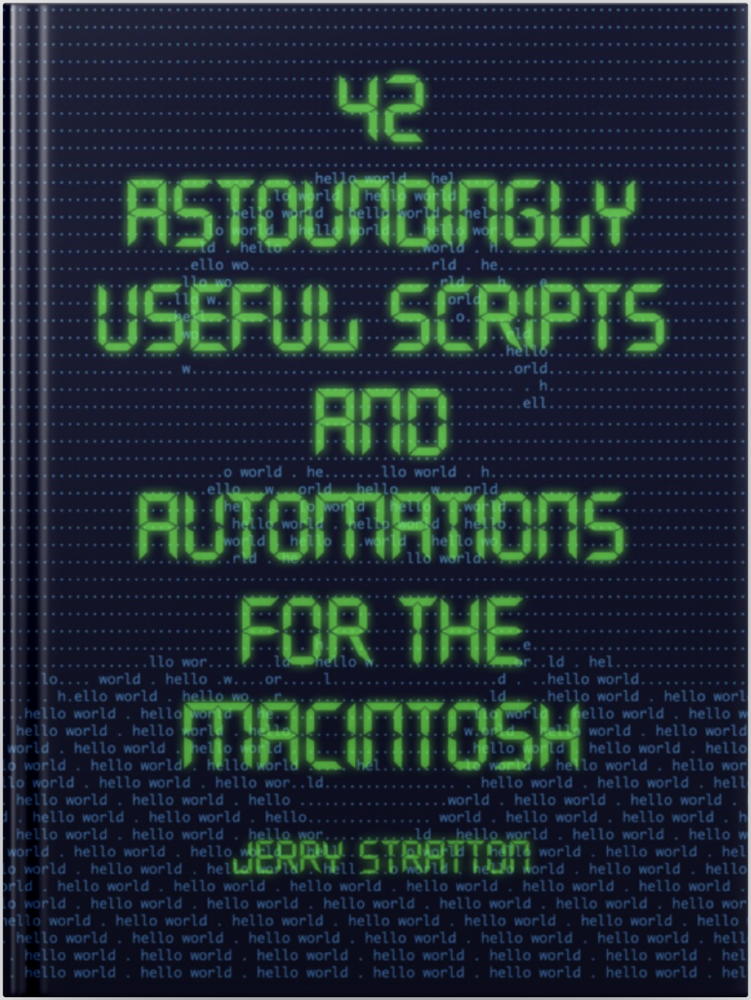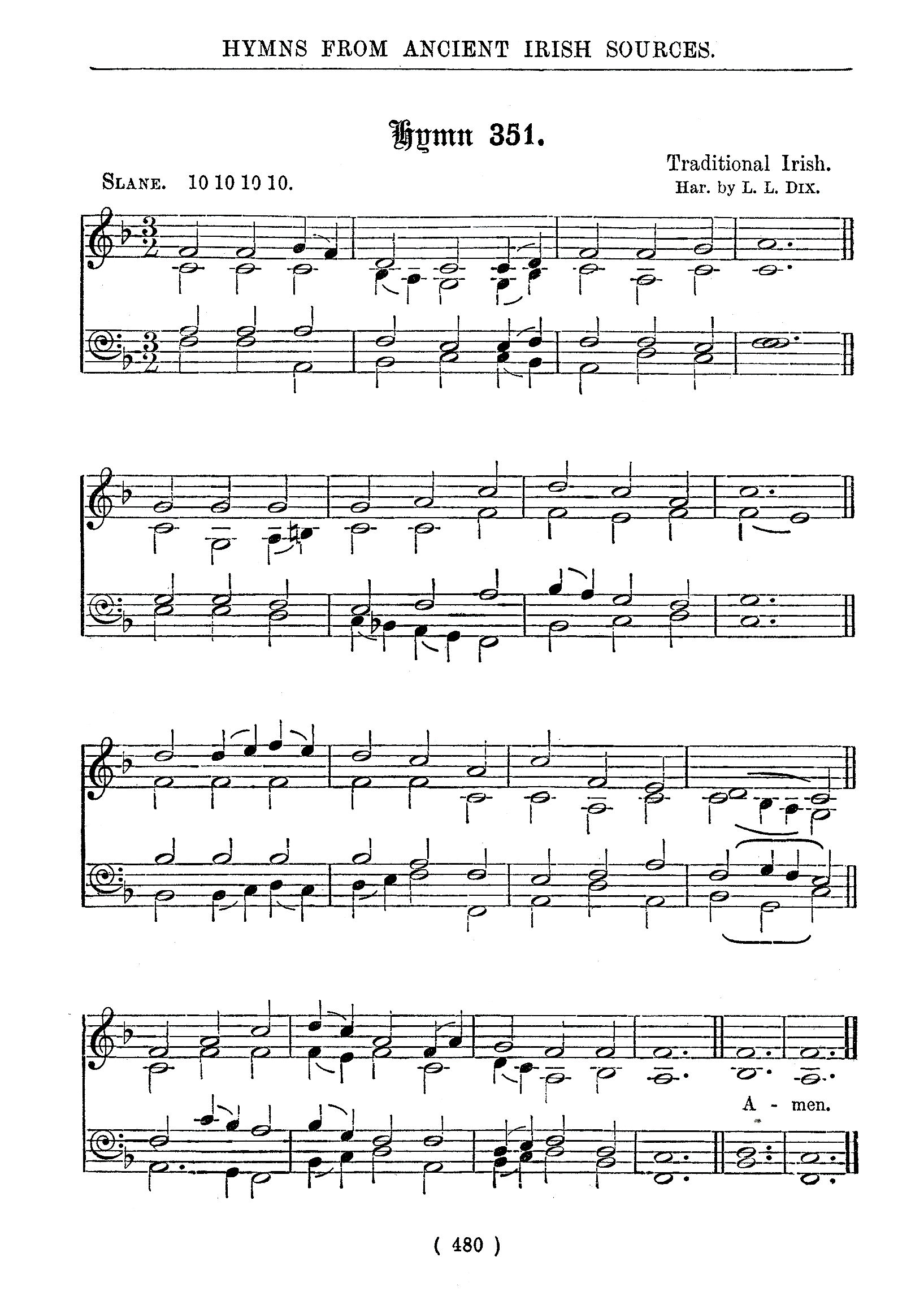- Save That Thou Art—Wednesday, April 9th, 2025
-
There are several hymns sung to the tune of the “Irish folk melody” Slane. It’s a storied tune, supposedly named after the Irish Hill of Slane were St. Patrick “lit an Easter fire in defiance of the pagan king Lóegaire”. It’s also very evocative. I first heard the tune in Lord of All Hopefulness, which ends each line with a countdown of the passing day: the break of the day, the noon of the day, the eve of the day, and the end of the day.
But my favorite is Be Thou My Vision, using words translated from a much earlier Irish poem. The original is, by tradition, attributed to the Irish poet and saint Dallán Forgaill. According to online sources, Mary Elizabeth Byrne translated “Rop Tú Mo Baile” from a Middle Gaelic poem to an English-language poem, and published it in 1905. Eleanor Hull “versified” the poem in 1912, though I can’t see whether she was versifying Byrne’s translations or going back to the original Gaelic.1
It’s not just that this earlier date puts it into the public domain that makes it my favorite—although that helps! As much as I enjoy Lord of All Hopefulness, there’s something contrived about its lyrics. In contrast, Be Thou My Vision is heartfelt and simple.
Looking at the various versions, the conversion from poem to hymn is an interesting class in how to translate a very personal prayer into a hymn to be sung during Catholic Mass.
- The Soul Felt It’s Worth—Wednesday, December 20th, 2023
-

Earlier this year I discovered the Brian Setzer Orchestra’s Boogie Woogie Christmas at a garage sale in Michigan. Their version of O Holy Night reminded me just how wonderful and inspiring a song O Holy Night is. And after a difficult year, how much it expresses the yearning and emptiness that celebrating Christmas both secularly and religiously can fill.
- Long lay the world in sin and error pining,
- Till He appeared and the soul felt its worth.
“A thrill of hope, the weary world rejoices…” Some Christmases we need the opportunity for rejoicing more than others.
There are three verses, but in my experience, “O Holy Night” is almost always sung with only the first verse. Partly I suspect that’s because the second and third verses don’t scan very well, and in addition the third verse’s mention of slavery is viewed as somewhat outdated. The line wasn’t initially directed at American slavery: the original lyrics were French. They were written in after the French revolution, in 1843; my guess is that the slaves in the lyrics almost certainly referred to French citizens, no longer slaves of the King and other royalty.
The lyrics were translated into English by Bostonian John Sullivan Dwight in 1855. Dwight’s translation is very loose, but the original third verse’s “Il voit un frère où n’était qu’un esclave…” tracks very closely with Dwight’s “for the slave is our brother”.
I can find no evidence that Dwight was an ardent or even occasional abolitionist. He was a music critic and magazine publisher. He did, apparently, include “the music of black Americans” in his magazine when submitted. The 1855 volumes of his magazine, if the Internet Archive’s OCR is to be trusted, contain no mention of “abolition” other than one about “the abolition of the mock auction system” in the selling of concert tickets and another about the “total abolition of hymn books”. The only mention of “negro” is in reference to music.
- Let mortal tongues awake—Wednesday, June 29th, 2022
-
Samuel Francis Smith’s America is a staple patriotic song at religious gatherings around Independence Day and other patriotic holidays. It’s more commonly known as “My Country, ’Tis of Thee” because “America” appears only obliquely in the lyrics as “Thy name I love” in the second verse. It is short, otherwise direct, and a wonderful combination of looking forward to liberty and looking backward to what that liberty cost.
Smith wrote America in 1831, when some people could still remember the events of the revolution and some were beginning to recognize the likelihood of further bloodshed in the name of liberty. He lived past our Civil War, and wrote hymns to the freedom secured through that great sacrifice, too.
The four verses rise from the birth of liberty, through the physical country, to hope for the spread of liberty, and end on a plea to God as the author of liberty to preserve and protect our country as a free country.
The several verses added later going into more detail about the beauties of our land seem excessively inventorical. The original second verse handles our country’s physical beauty just fine. I see no need to belabor the point. This is a hymn, after all, but not only that, one of the beauties of the hymn is it’s simplicity. Making it really long kills part of what makes it a great and memorable hymn.
The lyrics in my 1925 Hymns of Praise Number Two are:
- My country, ’tis of thee,
- Sweet land of liberty,
- Of thee I sing;
- Land where my fathers died,
- Land of the pilgrims’ pride,
- From every mountain side
- Let freedom ring!
- My native country, thee,
- Land of the noble free,
- Thy name I love;
- I love thy rocks and rills,
- Thy woods and templed hills;
- My heart with rapture thrills
- Like that above.
- Let music swell the breeze,
- And ring from all the trees
- Sweet freedom’s song;
- Let mortal tongues awake;
- Let all that breathe partake;
- Let rocks their silence break,
- The sound prolong.
- Our fathers’ God to Thee,
- Author of liberty,
- To Thee we sing;
- Long may our land be bright
- With freedom’s holy light;
- Protect us by Thy might,
- Great God our King.
- Holy, Holy! Lord God Almighty!—Wednesday, April 13th, 2022
-

Easter is coming, and Holy, Holy, Lord God Almighty, while not specifically an Easter Day song, is perfect for that morning sunrise. Reginald Heber wrote the lyrics specifically for Trinity Sunday, the first Sunday after Pentecost. The Easter season officially ends on Pentecost, after which we return to Ordinary Time; the first Sunday in which we return to Ordinary Time is Trinity Sunday, the Solemnity of the Most Holy Trinity.
Which is when we’re most likely to sing this song at Mass.
Holy, Holy is a very beautiful song, both its lyrics and its rousing melody. It’s the melody, of course, that I’m going to reproduce using the piano script.
Here are the full lyrics from Gospel Hymns Combined, an 1879 collection of hymns:
- Holy, Holy, Holy! Lord God Almighty!
- Early in the morning our song shall rise to Thee;
- Holy, Holy, Holy! Merciful and Mighty!
- God in three Persons, blessed Trinity!
- Holy, Holy, Holy! all the saints adore Thee,
- Casting down their golden crowns around the glassy sea;
- Cherubim and Seraphim falling down before Thee,
- Which wert and art, and evermore shall be.
- Holy, Holy, Holy! tho’ the darkness hide Thee,
- Though the eye of sinful man Thy glory may not see,
- Only Thou art Holy, there is none beside Thee,
- Perfect in pow’r, in love, and purity.
- Holy, Holy, Holy! Lord God Almighty!
- All Thy works shall praise Thy name in earth and sky, and sea;
- Holy, Holy, Holy! Merciful and Mighty!
- God in three Persons, blessed Trinity!
- Amen.
Modern hymnals often change these lyrics, which I’ll talk about later on my blog, but these are the longest-running lyrics and the most inspirational.
Reginald Heber’s religion wasn’t Catholicism; he was an Anglican. But the songs he wrote, especially this one, have spread throughout the hymnals of Christianity. In the text comparison I used while researching the lyrics, you can find Methodist hymnals, Lutheran hymnals, Presbyterian, Baptist, and Moravian hymnals.

42 Astoundingly Useful Scripts and Automations for the Macintosh
Music Hall
Source files for the Astounding Scripts player piano.
Jerry Stratton
